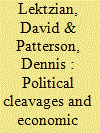| Srl | Item |
| 1 |
ID:
138298


|
|
|
|
|
| Summary/Abstract |
We develop and test a theory, based on the Stolper–Samuelson Theorem, of the effectiveness of sanctions. We treat sanctions as exogenously imposed changes in a country's exposure to international markets. In a country with an open-trade regime, owners and intensive users of the abundant factor of production hold economic and political power. In a country closed to trade, however, economic and political power rests with owners and intensive users of scarce factors. Thus, if real rates of return to the abundant factor decline during sanctions against a trade-open country, or real rates of return to the scarce factor decline during sanctions against a trade-closed country, we expect these economically and politically powerful segments of the targeted country to push hard for policy changes that would bring about an end to sanctions. Statistical analysis of sanctions episodes initiated between 1971 and 2000 provides support for the paper's expectations.
|
|
|
|
|
|
|
|
|
|
|
|
|
|
|
|
| 2 |
ID:
144863


|
|
|
|
|
| Summary/Abstract |
Although past scholarship shows that group inequalities in economic and political power (“Horizontal Inequalities”) correlate with dissent, violence, and civil wars, there is no direct empirical test of the perceptual explanation for this relationship at the individual level. Such explanation is vital to understanding how integration, inclusion in power-sharing agreements, and exclusion from political power filter down to mass publics. Moreover, subjective perceptions of group conditions do not always correspond to objective group realities. We hypothesize subjective perceptions attenuate the effect of objective exclusion on support for violence in ethnically divided societies. Cross-national comparative multilevel analyses of the 2005/6 Afrobarometer dataset (N = 19,278) confirm that subjective perceptions both amplify the effect of exclusion on acceptance of violence and alter the readiness of included groups to dissent. These findings carry implications for research, state-building, and conflict management.
|
|
|
|
|
|
|
|
|
|
|
|
|
|
|
|